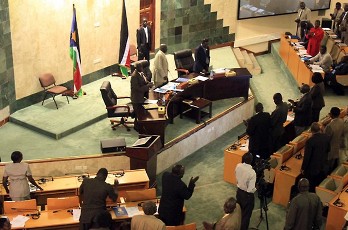Rights body urges S. Sudanese lawmakers to reject security bill
October 3, 2014 (JUBA) – A campaign group on Thursday advised members of South Sudan’s National Assembly not to pass the draft security bill, which appears repressive in its current form.

The draft bill grants the country’s National Security Service (NSS) sweeping powers to arrest, detain, seize property and conduct searches. Amnesty International described this mandate as “fundamentally flawed”, and against domestic and international laws.
“The bill grants the National Security Service virtually unrestricted powers of arrest, search and seizure and is at odds with South Sudan’s Transitional Constitution and with regional and international human rights law and standards. It should not be passed in its current form,” said Elizabeth Deng, an Amnesty International researcher.
“While the National Security Service urgently needs a legal mandate, any law passed must ensure appropriate limits on its powers and provide individuals adequate opportunity for redress. It grants officers immunity from criminal proceedings, opening the door to impunity,” she added.
according to Amnesty International, South Sudanese members of parliament should improve public dissemination of the draft bill and all other bills being considered.
“It [parliament] should make every effort to ensure easy, prompt, effective and practical access to these bills by citizens across the country,” Amnesty International said in the statement.
Having reportedly reviewed the draft law on Monday prior to its debate in parliament two days later, Amnesty International cited absence of provisions for accountability for members of the NSS, and failure to provide guarantees required under international human rights law as some of the short-falls within the proposed security law.
“The bill does not sufficiently provide for accountability of members of the NSS; unlawful behavior by NSS members is mainly subject to a special tribunal,” said the rights body in its statement.
“The bill grants members of the NSS immunity from criminal proceedings unless authorized by the Minister or Director General,” it added.
Since South Sudan gained independence in 2011, the NSS has been operating with no legal mandate as its officers have allegedly been engaged in unlawful arrests and detentions, undermining the right to freedom of expression by harassing, intimidating and arbitrarily detaining journalists, among others.
“With the above in mind, Amnesty International is calling for members of parliament to vote against the bill and to ensure that the bill is revised so that it is in keeping with the limited constitutional mandate of the NSS and complies with regional and international human rights law,” the campaign group argued.
HUMAN RIGHTS WATCH REACTS
Meanwhile, the US-based Human Rights Watch (HRW) also urged South Sudan’s lawmakers to overhaul draft legislation that would establish and regulate the powers of the NSS to ensure that it conforms with international human rights standards.
“As is, the National Security Service bill would sanction the national security service’s abusive and unlawful detentions and interrogations,” said Daniel Bekele, Africa director at HRW.
“South Sudan should insist on a higher standard instead of echoing Sudan’s draconian national security law,” he added.
The bill, according to HRW, should be revised to bring it in line with international human rights standards, and South Sudan’s Bill of Rights.
Since last year’s outbreak of violence in the country, HRW reportedly documented serious security service violations such as arbitrary detentions of people for their perceived political views with operatives allegedly increasing censorship and detained several journalists, creating an atmosphere of fear for journalists and independent groups.
(ST).
